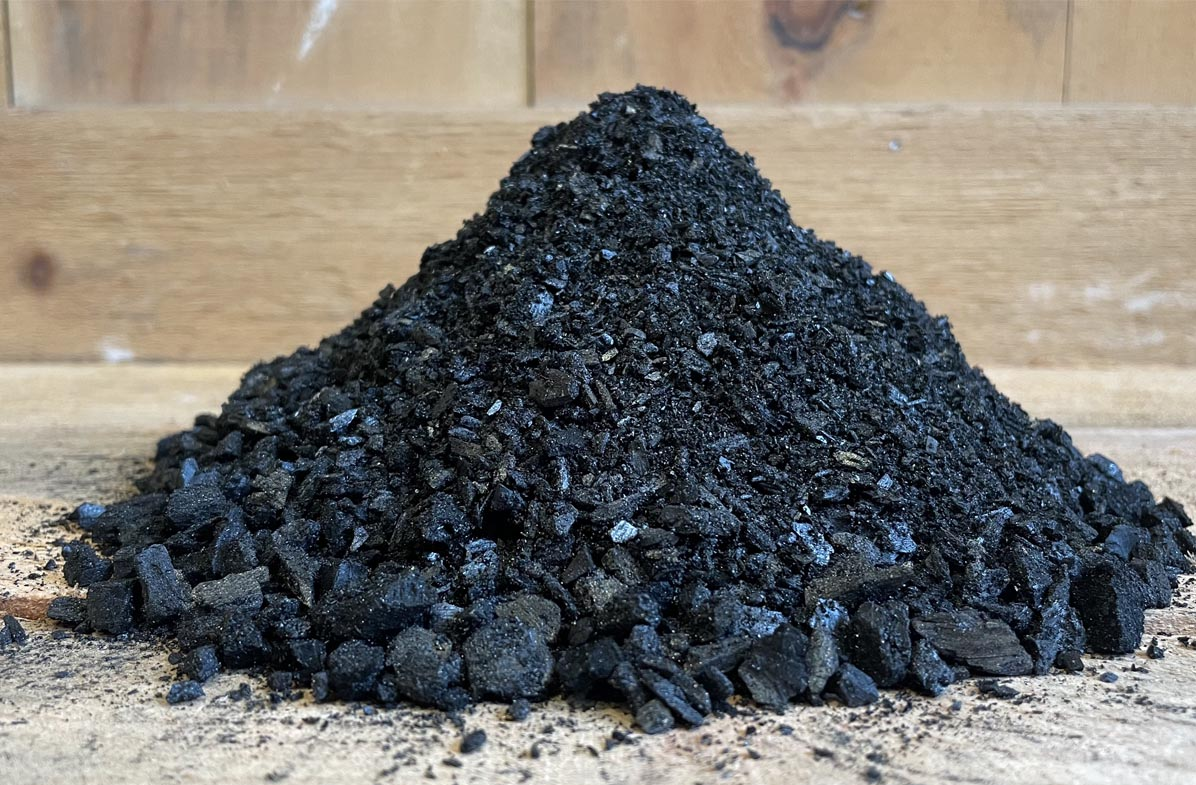
Learn About Biochar and Where to Use It
What is biochar?
Biochar is a form of charcoal produced by heating organic materials, such as wood or agricultural residues, in a controlled process called pyrolysis. During pyrolysis, the biomass is heated in a low to no oxygen environment, which prevents it from combusting and instead causes it to decompose thermally. The result is a stable, carbon-rich material that retains much of the original structure of the biomass but in a highly porous form. This porous nature gives biochar its unique properties, making it a valuable tool in various applications, particularly in improving soil structure, water retention, promoting soil health and carbon sequestration.
History
Biochar production is inspired by an ancient process from the Amazon Basin, where Indigenous people created islands of rich, fertile soils known as terra preta, or "dark earth." Anthropologists believe that these fertile soils were formed by a combination of cooking fires, kitchen waste, and the intentional addition of charcoal to the soil. These soils, still nutrient-rich and carbon-dense, continue to store carbon today and are so valued that they are sold as potting soil in Brazilian markets.
Explore biochar benefits
-
Biochar's porous structure acts like a sponge, retaining essential nutrients such as nitrogen, phosphorus, and potassium in the soil. This means that plants can access these nutrients over a longer period, leading to healthier growth and reduced need for chemical fertilizers.
-
Biochar can significantly improve the soil’s ability to retain water. Its porous structure allows it to hold moisture, making it available to plants during dry periods. This not only supports plant growth but also reduces the frequency of watering, conserving valuable water resources.
-
The structure of biochar helps to break up compacted soils, enhancing soil aeration and drainage. This allows plant roots to grow more freely and access oxygen more efficiently, promoting robust plant health and preventing issues like root rot.
-
Biochar provides an ideal habitat for beneficial soil microbes. By fostering a healthy microbial community, biochar enhances nutrient cycling and soil fertility, leading to healthier plants and more resilient ecosystems.
-
Biochar is a stable form of carbon that can remain in the soil for hundreds to thousands of years. By locking away carbon, biochar helps mitigate climate change while improving soil health. It’s a sustainable solution that benefits both the environment and agriculture.
Where to use our biochar
Gardens
Biochar is an amazing addition to gardens. It increases water retention, improves soil structure, and creates an environment that fosters plant health. Whether you're growing flowers, vegetables, or herbs, biochar can enhance the vitality of your garden by improving nutrient availability and supporting beneficial soil organisms.
Compost
With biochar, composting becomes faster, cleaner, and more sustainable. It’s a win-win for your garden and the environment!
Biochar enhances the composting process by creating an ideal environment for beneficial microbes. Its porous structure provides shelter, retains moisture, and adsorbs nutrients, accelerating microbial activity. This increased activity generates heat, speeding up decomposition and improving compost quality.
It also reduces greenhouse gas emissions by improving aeration, lowering nitrous oxide emissions, and limiting anaerobic conditions that favor methane production. Additionally, biochar absorbs unpleasant odours, buffers pH, and enhances compost structure, making it a powerful addition to composting for nutrient-rich, sustainable soil applications.
Potted plants and raised garden beds
Biochar is perfect for mixing into soil for potted plants or raised beds. It improves the soil mix by retaining moisture, enhancing nutrient availability, and supporting the long-term health of your plants. Whether you're growing indoor houseplants or outdoor raised gardens, biochar can help your plants thrive while reducing the need for frequent watering.
Agriculture
In agricultural settings, biochar is a valuable soil amendment that can improve crop yields, reduce the need for chemical fertilizers, and promote sustainable farming practices. By enhancing soil structure, nutrient retention, and microbial activity, biochar supports healthier crops and more resilient soils, contributing to long-term agricultural productivity.
Our biochar
Our biochar is made sustainably from Ontario wood that would otherwise be burned, chipped, or left to rot—processes that release greenhouse gases and particulates into the air. Instead, we use advanced mobile carbonator technology to produce biochar on-site through pyrolysis, reducing pollution and eliminating transportation emissions.
Our process captures gases within the pyrolysis chamber, minimizing harmful emissions like CO2, methane, and particulates. This results in a cleaner process with a lower carbon footprint.
Our biochar is rich in organic carbon (at least 75%), with high surface area and porosity for enhanced nutrient interactions and water absorption. The ash content is under 16%. The pH is alkaline and between 9-9.4. We have generally aligned our laboratory analysis with the International Biochar Initiative voluntary testing. This ensures we know our product and can be confident in its quality.
